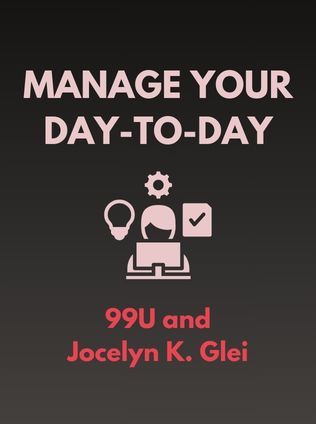
Manage Your Day-to-Day
Build Your Routine, Find Your Focus, and Sharpen Your Creative Mind (99U)
By 99U and Jocelyn K. Glei
Published 05/2013
About the Author
Jocelyn K. Glei, the editor and curator of Manage Your Day-to-Day, is a distinguished creative consultant, writer, and speaker known for her ability to synthesize complex ideas into actionable advice. As the director of 99U, a resource platform that empowers creative professionals, Glei has dedicated her career to helping individuals harness their creative potential in a world that often prioritizes efficiency over depth. Glei's editorial work is a testament to her commitment to promoting disciplined work habits that foster sustained creativity. Her collaborations with leading thinkers in creativity and productivity, including Cal Newport, Steven Pressfield, and Gretchen Rubin, reflect her deep understanding of the challenges faced by modern creatives.
In addition to her role at 99U, Glei is the host of the popular podcast Hurry Slowly, where she explores the intersection of productivity, creativity, and mindfulness. Her work extends to offering a four-week online productivity course called RESET, designed to help individuals rethink their relationship with work and develop habits that support both productivity and well-being. Glei's approach is grounded in the belief that true creativity emerges from consistent, disciplined work rather than sporadic bursts of inspiration.
Main Idea
Manage Your Day-to-Day is a collection of essays curated by Jocelyn K. Glei that offers practical strategies for creative professionals to build a routine that supports their creative work, improve their focus in a world full of distractions, and cultivate a mindset that embraces challenges as opportunities for growth. The book presents a roadmap for navigating the complexities of modern life while maintaining the discipline and inspiration necessary for sustained creative output. By drawing on the insights of various experts, Glei provides readers with tools to develop a disciplined approach to creativity that balances routine, rest, and spontaneity.
The book's central theme is that creativity is not a mystical act but a practice that requires intentionality and consistency. The contributors argue that by establishing a routine, improving focus, and honing a creative mindset, individuals can unlock their full creative potential and achieve their goals, whether they are writers, artists, entrepreneurs, or anyone engaged in creative work.
Table of Contents
- How to Develop a Routine That Supports Creativity
- How to Improve Your Focus
- How to Hone Your Creative Mindset
How to Develop a Routine That Supports Creativity
At the heart of Manage Your Day-to-Day is the idea that creativity thrives on routine. The contributors to the book emphasize that without a structured approach to your day, it's challenging to make meaningful progress on creative projects. Poet and creativity coach Mark McGuinness suggests that the first step in developing a creative routine is identifying when you are most focused and alert during the day. This period of peak focus, often dictated by your circadian rhythm, is when you should schedule your most important creative work.
McGuinness explains that everyone has a unique circadian rhythm, which influences their mental alertness throughout the day. For example, "morning types," often referred to as "larks," are most focused in the early morning, while "night types," or "owls," find their creative energy peaks in the evening. Understanding your chronotype can help you align your creative work with your natural energy levels, ensuring that you are working at your best during your most productive hours.
"Creativity is not a mystical act; it is a practice of disciplined routine." - Mark McGuinness
Cal Newport, author of Deep Work, builds on this idea by advocating for the deliberate scheduling of deep work—cognitively demanding tasks that require undistracted focus. Newport suggests that once you have identified your peak focus periods, you should block out time in your calendar specifically for deep work. This time should be treated as sacred, free from interruptions such as phone calls, emails, or spontaneous meetings. By protecting this time, you can fully immerse yourself in your creative projects and make significant progress.
Newport outlines several strategies for scheduling deep work, depending on your lifestyle and obligations:
Sign up for FREE and get access to 1,400+ books summaries.
You May Also Like
The Subtle Art of Not Giving a F*ck
A Counterintuitive Approach to Living a Good Life
By Mark MansonRich Dad Poor Dad
What the Rich Teach Their Kids About Money - That the Poor and Middle Class Do Not!
By Robert T. KiyosakiHow To Win Friends and Influence People
The All-Time Classic Manual Of People Skills
By Dale CarnegieQuiet: The Power of Introverts
The Power of Introverts in a World That Can't Stop Talking
By Susan Cain



















